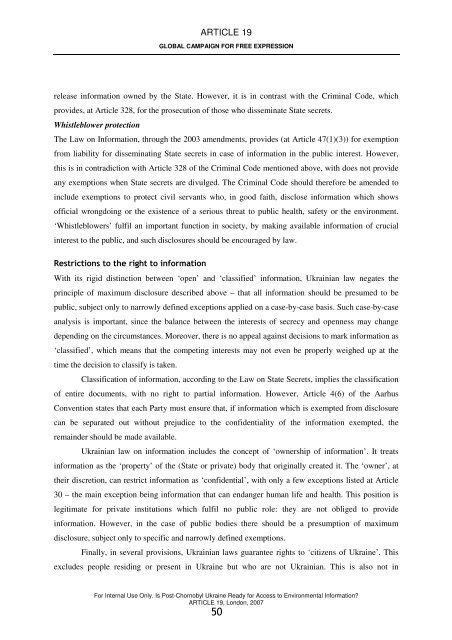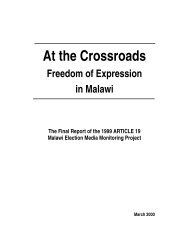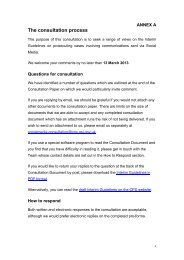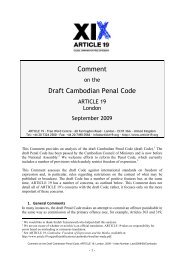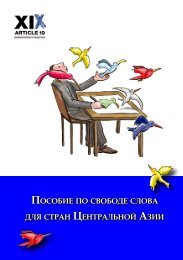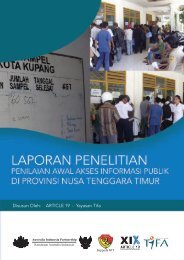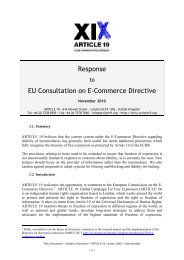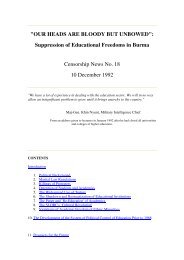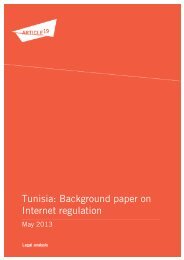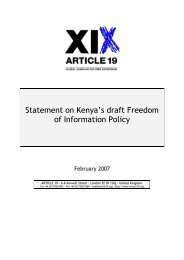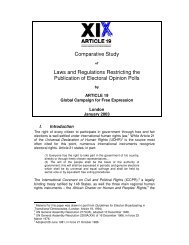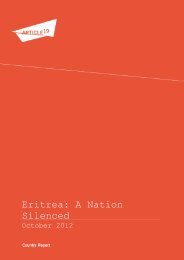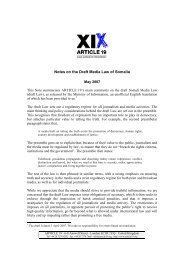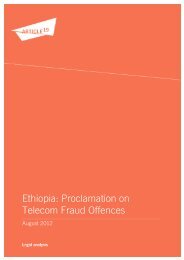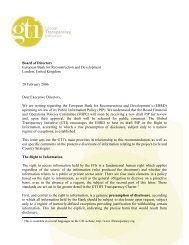FOR INTERNAL USE ONLY - Article 19
FOR INTERNAL USE ONLY - Article 19
FOR INTERNAL USE ONLY - Article 19
- No tags were found...
You also want an ePaper? Increase the reach of your titles
YUMPU automatically turns print PDFs into web optimized ePapers that Google loves.
ARTICLE <strong>19</strong>GLOBAL CAMPAIGN <strong>FOR</strong> FREE EXPRESSIONrelease information owned by the State. However, it is in contrast with the Criminal Code, whichprovides, at <strong>Article</strong> 328, for the prosecution of those who disseminate State secrets.Whistleblower protectionThe Law on Information, through the 2003 amendments, provides (at <strong>Article</strong> 47(1)(3)) for exemptionfrom liability for disseminating State secrets in case of information in the public interest. However,this is in contradiction with <strong>Article</strong> 328 of the Criminal Code mentioned above, with does not provideany exemptions when State secrets are divulged. The Criminal Code should therefore be amended toinclude exemptions to protect civil servants who, in good faith, disclose information which showsofficial wrongdoing or the existence of a serious threat to public health, safety or the environment.‘Whistleblowers’ fulfil an important function in society, by making available information of crucialinterest to the public, and such disclosures should be encouraged by law. ." With its rigid distinction between ‘open’ and ‘classified’ information, Ukrainian law negates theprinciple of maximum disclosure described above – that all information should be presumed to bepublic, subject only to narrowly defined exceptions applied on a case-by-case basis. Such case-by-caseanalysis is important, since the balance between the interests of secrecy and openness may changedepending on the circumstances. Moreover, there is no appeal against decisions to mark information as‘classified’, which means that the competing interests may not even be properly weighed up at thetime the decision to classify is taken.Classification of information, according to the Law on State Secrets, implies the classificationof entire documents, with no right to partial information. However, <strong>Article</strong> 4(6) of the AarhusConvention states that each Party must ensure that, if information which is exempted from disclosurecan be separated out without prejudice to the confidentiality of the information exempted, theremainder should be made available.Ukrainian law on information includes the concept of ‘ownership of information’. It treatsinformation as the ‘property’ of the (State or private) body that originally created it. The ‘owner’, attheir discretion, can restrict information as ‘confidential’, with only a few exceptions listed at <strong>Article</strong>30 – the main exception being information that can endanger human life and health. This position islegitimate for private institutions which fulfil no public role: they are not obliged to provideinformation. However, in the case of public bodies there should be a presumption of maximumdisclosure, subject only to specific and narrowly defined exemptions.Finally, in several provisions, Ukrainian laws guarantee rights to ‘citizens of Ukraine’. Thisexcludes people residing or present in Ukraine but who are not Ukrainian. This is also not inFor Internal Use Only. Is Post-Chornobyl Ukraine Ready for Access to Environmental Information?ARTICLE <strong>19</strong>, London, 2007&,


